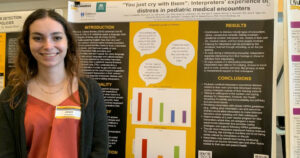A medical interpreter’s job is to help patients and their care providers communicate. Patients and doctors with a language barrier need interpreters’ help to speak about symptoms, treatment options, insurance, and more.
But the job can take a toll, especially on the people who translate for pediatric patients and their families. That is the central component of Josie Carballido’s research.
“We want to prove that pediatric medical interpreters are experiencing distress because of their work,” she said. “Then we want to get to the bottom of what kinds of factors are causing it. How are they coping with it? And what can the hospital do to help interpreters with their mental health?”
Carballido, who is set to graduate in May, is a psychology major and a student researcher. Last week, she presented her work at UWM’s Undergraduate Research Symposium, which highlights the efforts of the university’s many student researchers across each school and college.
Carballido has been involved in research since her first year at UWM when psychology professor W. Hobart Davies asked her to join his lab. For this project, she’s also worked with Amy Olen, an assistant professor of Translation and Interpreting Studies. The overall project is led by psychology PhD student Paulina Lim.
Together, the team has interviewed 13 Spanish-to-English pediatric medical interpreters from children’s hospitals in Wisconsin, asking them a series of questions about their work, stress, and coping mechanisms. Carballido’s job was to transcribe each interview and then analyze the responses for common themes.
“A big thing that we’re finding was that the majority of staff interpreters are receiving some sort of emotional wellness training, but … it seems to be just a one-time traumainformed care training, and then that’s it. A lot of the contracted (interpreters) don’t get that training,” Carballido said.
“We also have looked a lot at what kind of factors are making interpreters more distressed in an encounter. If they’re in something like an ICU or NICU, or dealing with abuse or end-of-life care, those make it lot harder than something like interpreting in the Ear, Nose, and Throat clinic.”
Other stressful factors include whether the interpreter personally identifies with their patient or family – if they have had a family member with a similar medical problem, for example, or if they have a child the same age as the patient.
“There’s evidence that (interpreters) experienced secondary traumatic stress,” Carballido said. “When they are witnessing a patient and their trauma and their stress, then they can internalize that as well, and it can traumatize (the interpreter) too. There seems to be a lot of that when they’re working in intense situations.”
Finally, Carballido said, the nature of the job is stressful: interpreters are not supposed to be emotional as they translate for their clients. Even in a sad or traumatic situation, they are expected to remain unaffected and faithfully interpret messages between the patients and care providers.
In the interviews, interpreters detailed a number of coping mechanisms that they developed to help them deal with the stress of their job, but by far, Carballido said, the most frequent and effective coping method was talking through bad situations with their colleagues.
But that came with its own set of problems.
“(Interpreters) feel like HIPAA is a barrier to them being able to talk to each other,” Carballido noted.
HIPAA, or the Health Insurance Portability and Accountability Act, mandates that health care providers protect their patients’ medical and identifying information. Carballido has found that interpreters are unsure if sharing details about their jobs with their colleagues violates that mandate.
“I’ve been finding that with HIPAA, as long as you are not using identifiers like names, you can share things with each other,” she said. “So, I’m looking at implementing some sort of training program, like continuing education, regarding HIPAA. (I’m also interested in) encouraging interpreters to speak with each other, setting up support groups for them, or setting up a peer mentor program.”
Carballido has worked on a manuscript detailing the group’s findings, which has been submitted for publication. She’s also expanded on this research for her senior thesis.
The research is important, she added, because it’s never been done before. While some psychologists have previously studied the emotional toll of medical interpretation, no one has studied how pediatric medical interpreters are impacted by their jobs. Carballido hopes that her work can help shed light on the problem and bring attention to possible solutions.
